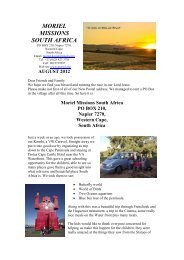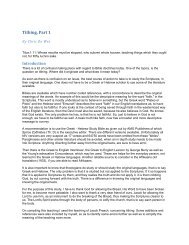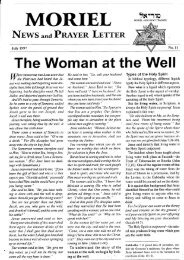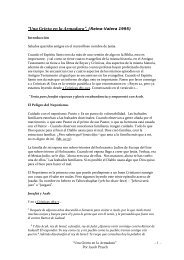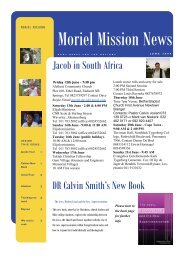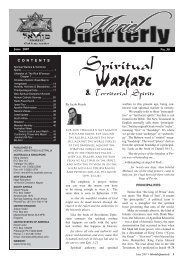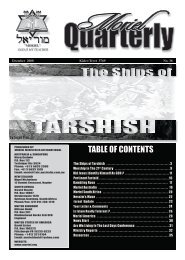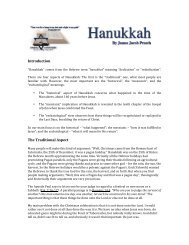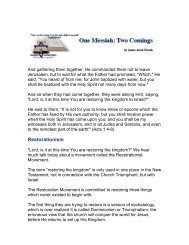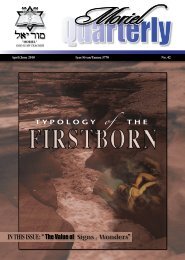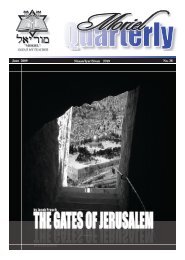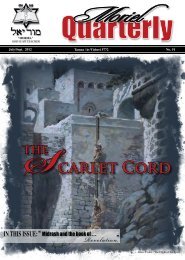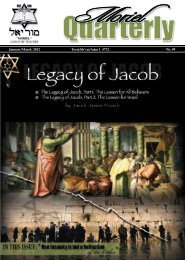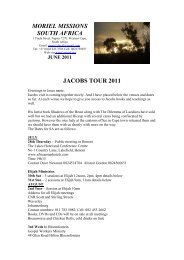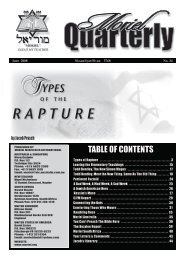The Wedding Feast (~19.49) - Moriel Ministries
The Wedding Feast (~19.49) - Moriel Ministries
The Wedding Feast (~19.49) - Moriel Ministries
You also want an ePaper? Increase the reach of your titles
YUMPU automatically turns print PDFs into web optimized ePapers that Google loves.
Special Interest<br />
Jacob Prasch<br />
“ <strong>The</strong> Road to Emmaus”<br />
At this time we are, by the Jewish<br />
calendar, sandwiched in between “Hag<br />
Mazot” and “Hag Shavu’ot” – Passover<br />
and the <strong>Feast</strong> of Weeks, which in Christian<br />
terms corresponds to the resurrection of<br />
Jesus up until the day of Pentecost. It was<br />
during this particular period of time when<br />
Jesus, having risen from the dead, began<br />
appearing to His disciples, beginning, of<br />
course, in the garden with the resurrection.<br />
He would then come and walk through<br />
walls in Jerusalem; He would show up<br />
on the shores of the Sea of Galilee. <strong>The</strong>n<br />
there was His famous encounter on the<br />
road to Emmaus, which is what we will<br />
look at here.<br />
What Happens to Jesus<br />
Happens to Us<br />
Let us begin with the Hebrew prophet<br />
Hosea – “Howshea Ha’Nabiy.”<br />
“Come, let us return to the LORD. For<br />
He has torn us, but He will heal us;<br />
He has wounded us, but He will bandage<br />
us. He will revive us after two<br />
days; He will raise us up on the third<br />
day, That we may live before Him. So<br />
let us know, let us press on to know<br />
the LORD. His going forth is as certain<br />
as the dawn; And He will come to<br />
us like the rain, Like the spring rain<br />
watering the earth.” (Hosea 6:1-3)<br />
We have here three verses, each with a<br />
prophecy about Jesus, but somehow Hosea<br />
says they equally apply to us in some sense.<br />
“Let us return to the LORD.” “Return”<br />
is “tesuba,” the Hebrew word for “repent”<br />
meaning to turn back to God. We think of<br />
repentance as when we are born again, but<br />
Jesus tells the assembly at Ephesus, an assembly<br />
with correct doctrine and good<br />
work, to return to their first love. (Rev 2:4,5)<br />
But then we read…<br />
“…He has torn us, but He will heal<br />
us; He has wounded us, but He will<br />
bandage us.”<br />
What happened to Jesus? He was<br />
wounded. <strong>The</strong> same term is used in Isaiah<br />
– literally, “He was cut into” (Is. 53:5)<br />
– “paga” means “cut into.” This word<br />
“paga” – “wounded,” “cut into” – is the<br />
source of the Hebrew word “to intercede”<br />
which means to be wounded on behalf of<br />
another. And although there is a wounding,<br />
the Lord brings a healing. On the cross<br />
Jesus was wounded on our behalf, but of<br />
course in the resurrection, as it were, He<br />
was healed. And when the Lord wounds<br />
us, He likewise bandages us.<br />
He will revive us after two days; He<br />
will raise us up on the third day, That<br />
we may live before Him.<br />
What happens to Jesus happens to us.<br />
It is not just saying Jesus rises on the third<br />
day, but it says we rise up on the third day.<br />
His death is our death; therefore His resurrection<br />
is our resurrection. Think of the<br />
resurrection as prolific.<br />
We are not waiting for the Rapture or<br />
the resurrection; the Rapture and the resurrection<br />
are already underway. We are<br />
waiting for our role in it. <strong>The</strong> resurrection<br />
began with the First Fruit – Jesus was<br />
the First Fruit of the resurrection (1 Cor.<br />
15:20). Because His death is our death,<br />
His resurrection is our resurrection. <strong>The</strong><br />
resurrection has already begun and we are<br />
simply waiting for our role in it. Likewise<br />
with the ascension; the Rapture has already<br />
begun. We are not waiting for the Rapture;<br />
we are waiting for our role in it. This is<br />
why Hebrews 1 provides the context, “in<br />
these last days” (Heb. 1:2), because we are<br />
already in the Last Days. <strong>The</strong> Rapture and<br />
resurrection have already begun.<br />
<strong>The</strong> best way I explain this is the example<br />
of the Normandy Invasion, so-called<br />
“D-Day,” in June of 1944. Officially, D-Day<br />
was June 6, 1944, but it actually began on<br />
June 5, when American and British commandos<br />
were being dropped behind German<br />
lines by parachute and were cutting<br />
communications lines. But it was a secret.<br />
It was not known what actually happened.<br />
Even though the invasion of Normandy began<br />
on June 5 th , only certain people knew it<br />
was the invasion. It was not until the next<br />
day, D-Day, that everybody knew what<br />
was happening when the amphibious landings<br />
took place on the beaches.<br />
It is the same thing with the Last Days.<br />
<strong>The</strong> Last Days have already begun, but<br />
only the initiated know it. Only we know<br />
it. It began with the resurrection and the ascension<br />
of Jesus – the world does not know<br />
it yet. We are like the British and American<br />
commandos who were parachuted behind<br />
the German lines to prepare the way for<br />
the big invasion. We are simply here to<br />
usher in the coming age, the return of the<br />
Lord. Jesus will return and the invasion is,<br />
indeed, coming. <strong>The</strong> invasion is already<br />
underway. We are simply waiting for it to<br />
become obvious to everybody else, but we<br />
know it is happening already.<br />
His death is our death, his resurrection<br />
is our resurrection. But then it continues…<br />
So let us know; let us press on to know<br />
the LORD. His going forth is as certain<br />
as the dawn;<br />
Again, all four Gospels say He rose<br />
on “Hag Ha’Mazot,” the Hebrew <strong>Feast</strong><br />
of First Fruits, the first day of the week,<br />
at dawn when it was still dark. But then it<br />
says as a prophecy of Pentecost…<br />
And He will come to us like the rain,<br />
Like the spring rain watering the<br />
earth.” (Hosea 6:3)<br />
<strong>The</strong> outpouring of rain forming in the<br />
water table, “maim hayim” – “living water”<br />
– is a metaphor for the Holy Spirit.<br />
12 <strong>Moriel</strong> Quarterly • December 2009



